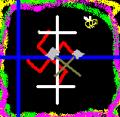Factors Preventing The Possibility Of Life In the universe
#1

Posted 14 October 2003 - 10:04 PM
- We are lucky that the sun outputs a relatively stable amount of energy. If the output was altered by one or two percent, life would be very difficult. Everything would either freeze or overheat. Many stars pulsate (not talking about pulsars), changing their energy output constantly.
- Supernovae are EXTREMELY powerful. In a short period they output more energy than the rest of the galaxy combined, and can easily "out-shine" galaxies (they stand out as bright stars in other galaxies). We aren't in much danger of the sun collapsing, though it would be bad news if another *relatively* nearby star blew up.
- Meteors and comets regularly strike planets. While most that strike the earth are small, there are many large chunks of rock and comets orbiting the sun. If a small meteorite has the capability of practically blowing up a house on impact (which sometimes happens on rare occasions), imagine one a few miles in diameter striking us. It would be very bad, and the chances of one striking us aren't really as small as many believe (small, but could realistically happen if we're unlucky).
- The sun could, at any given second, incinerate the earth with a solar flare or something else (I'll have to check about solar flares, but I know that the sun can reach us with some of its more destructive occurances). Just recently, I believe about 10 years ago, the sun emitted a flare or something else which could have reached us (obviously it wasn't at us). If we happened to be in the path, that would be the end.
- On a more universal scale, while unlikely, galaxies do collide. Their gravity would pull them together, and one will practically crash right through the other. Then the gravity would pull the other back, causing reformation of both and forming one larger galaxy. Something of this magnitude will be likely to disrupt and/or cause the destruction of many stars and planets. While the galaxy is not a solid object (cannot physically "crash" through another), the disruptions of stars and their gravitational pulls would not be good for anything at all.
- I don't know much about these, but I hear that "gamma ray bursts", making supernovae look like firecrackers, sometimes occur on a galactic scale. I don't know how they would affect the stars far from the center (like us), though the incredible amount of energy, heat, and radiation would incinerate everything somehow caught up in one. Don't quote me on that, but I'll be sure to investigate this a little later.
These are just a few of the happenings which would challenge life in the universe. It is because of these factors that I don't believe that relatively advanced life exists in great numbers in the universe.
Note: Climate should not be considered a factor, for what we may require to live may be different for something elsewhere in the universe.

#2

Posted 14 October 2003 - 10:08 PM
Our planet is extremely lucky.
I'll bet the chances are at least 1/1,000,000 that another planet would have as much luck as ours.
We just happen to be at the exact right distance from Sol (Our sun) and have been in just the right orbit for millions of years.
Then, we haven't had any unlucky solar flares, asteroids, glactical collisions, etc. in many a millenium.
#3

Posted 14 October 2003 - 10:54 PM

#5

Posted 15 October 2003 - 06:43 PM
| QUOTE |
| One other thing. You were talking about Supernovae? What about Ultranovae (or maybe something else, can't remember) Anyway, it's something just as powerful that can explode on the other side of this galaxy, and still affect us... Although it's very rare. |
Haven't heard of Ultranovae, are they theoretical or have they been seen? (just wondering)

#7

Posted 15 October 2003 - 08:51 PM
| QUOTE |
| - Meteors and comets regularly strike planets. While most that strike the earth are small, there are many large chunks of rock and comets orbiting the sun. If a small meteorite has the capability of practically blowing up a house on impact (which sometimes happens on rare occasions), imagine one a few miles in diameter striking us. It would be very bad, and the chances of one striking us aren't really as small as many believe (small, but could realistically happen if we're unlucky). |
| QUOTE |
| In the summer the earth is 148,000,000 miles from the sun. In the winter it is 152,000,000 (thus giving the measuring unit AU 150,000,000 *Average of 152,000,000 and 148,000,000*) What if one year we went a little closer? (Actually very close.) What if it dropped to 140,000,000 one year? Or went to 160,000,000? Florida would end up like an extremly exaggerated Antartica or like an extremely exaggerated Sahara desert. Thus life would cease to exist. The universe if full of What if's. LOL |
#8

Posted 15 October 2003 - 08:54 PM
| QUOTE |
| - Meteors and comets regularly strike planets. While most that strike the earth are small, there are many large chunks of rock and comets orbiting the sun. If a small meteorite has the capability of practically blowing up a house on impact (which sometimes happens on rare occasions), imagine one a few miles in diameter striking us. It would be very bad, and the chances of one striking us aren't really as small as many believe (small, but could realistically happen if we're unlucky). |
Jupiter absorbs most of the meteors that could have hit the Earth.
#9

Posted 15 October 2003 - 09:51 PM
Yeah, they exist, and it's happened. 2 years ago, we had a guy (He's one of the smartest people in under 18 in the city right now) did a report of supernovae, and for bonu marks he added something on ultranovae. They are extremely powerful... I remember he had a caculation for the ammount of energy put out of a supernova...
#10

Posted 16 October 2003 - 12:26 AM
| QUOTE |
| Yeah, they exist, and it's happened. 2 years ago, we had a guy (He's one of the smartest people in under 18 in the city right now) did a report of supernovae, and for bonu marks he added something on ultranovae. They are extremely powerful... I remember he had a caculation for the ammount of energy put out of a supernova... |
Neat! I'll check them out when I get the chance

#12

Posted 03 October 2005 - 01:46 AM
The only gamma ray bursts reported happend from the 2nd or 3rd generation of stars. Very old stars. But they are rare and more are probably dying.
#14

Posted 13 October 2005 - 01:33 AM

GWAMM
#15

Posted 13 October 2005 - 08:33 AM
Suprisingly, not much collision actually occurs. I have a simulation of galaxy collision on my computer, but it is protected by copyright.
In fact, the one that started the age of the dinosaurs was far bigger, raising the tempreture by 10 degrees and killing 95% of life.

^ Thanks to Nazy for the... thingy ^
Things which you should look at:
SKoA - http://skoa.cspacezone.com/ , if you have any Age of Empires games.
The DS Garden Festival Minigame - Link , whether you play DStorm or not.
The Most Mysterious SSSS - Link For people who don't care about...things.
Like LEGO? Play Blockland!
 Sign In
Sign In Register
Register Help
Help

 This topic is locked
This topic is locked



 MultiQuote
MultiQuote









